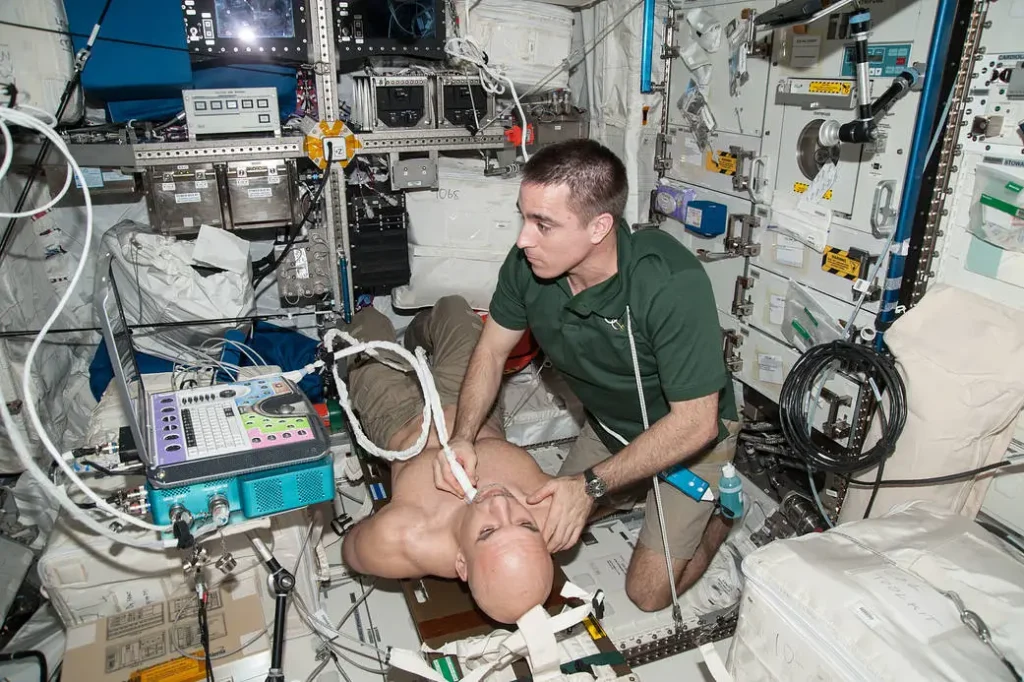Houston, do we have a lawyer? The Legal Black Hole of Astronaut Health Care
It’s 2035. A spacecraft’s chief physician collapses half-way to Mars after suffering a massive stroke. The crew is scrambling to find a telemedicine line, even though Earth is more than 50,000,000 miles away. In the midst of this high-stakes situation, there are still questions: Who is legally authorized to perform medical interventions? Whose medical license is valid in outer space? Who is responsible for the treatment outcomes if an astronaut’s life is at stake beyond Earth’s orbit, and remote medical guidance fails to work?
As mankind pushes further into space, our legal framework is still stuck in the past – fragmented, outdated, and woefully insufficient. Although astronauts sign extensive liability waivers before liftoff, which may limit lawsuits, these are patchwork, jurisdiction bound contracts that do provide blanket legal immunity. They also do not shield the agency against claims related to willful conduct, or claims made by a natural individual for bodily injury, or death. Critical areas like telemedicine liability, cross-border medical licensing, and mental health protection for astronauts still fall through the cracks of international law, leaving spacefarers in a legal black hole.
Outdated Space Treaties vs. Modern Medical Needs
Current international space laws were crafted during the Cold War’s rapid space-race era when missions were brief and Earth-centric. These outdated laws are no longer able to protect astronauts’ health as they face delays that can extend missions from weeks to months or even years. These instruments focus on the rescue and return obligations of astronauts (the “envoys for mankind” as the treaties proclaim), but offer little guidance on routine health care in space or long-term management. The 1968 Rescue Agreement only addresses astronaut emergencies on landings and excludes broader medical assistance. The modern medical challenges, from radiation-induced cancer to the physiological effects of microgravity, require regulations that go beyond rescue protocols. The current treaties do not take into account the possibility of advanced telehealth technology or complex liability issues which may arise when a doctor’s remote guidance during a medical crisis in deep space is the only lifeline. The ISS legal structure, which is comprised of the International Space Station Intergovernmental Agreement (ISS IGA), MoUs, bilateral agreements between partner agencies and a multilateral code of conduct, provides a minimum level of health and safety to crew members. National efforts such as the TREAT astronauts act in the U.S., or the Health Beyond Initiative, in Canada, and other efforts to modernize astronaut health records are further efforts to address the health challenges faced by astronauts deep space. Yet, these initiatives are limited to domestic application.
Thus, while the ISS regime shows that international cooperation on space medicine is possible, it is far from comprehensive. Each agency’s approach is siloed. This leaves astronaut protections and liability in the event of a medical emergency as fragmented as their national policies. Scholars have highlighted that while national laws and policies in major spacefaring states like the U.S. and Russia provide robust physical and psychological protections, these measures lack international cohesion–a problematic notion for multinational crew missions or when a spacecraft ventures far beyond the protective cocoon of the ISS.
Telemedicine Across Borders: Medical Miracle, Legal Nightmare
As missions extend beyond low Earth orbit, telemedicine is the linchpin of in-flight health care. Telemedicine is the cornerstone of in-flight health care as missions extend beyond low Earth orbit. As spacecraft travel farther from Earth, remote diagnosis, AI-driven monitoring and real-time consultation are essential. Deep Space Health Care Challenge was a groundbreaking initiative in this area. It recently awarded prizes to AI-powered diagnostic tools and remote-treatments tailored for space medicine. This highlights telemedicine’s ability to revolutionize the delivery of health care beyond Earth. Terrestrial telemedicine is governed by national laws. Which medical license would apply if an American astronaut was being operated on by a Canadian physician in a Mars-bound mission? A member of the International Space Station crew performs an ultrasound examination onboard with remote guidance from Earth. This is a great example of telemedicine in outer space. Photo courtesy of NASA.
Mental Health: The Invisible Emergency
Beyond physical ailments, the psychological toll of space travel is profound. Extended isolation, sensory deprivation, and confinement can trigger depression, anxiety and even cognitive decline. Existing treaties are primarily focused on physical rescue and leave mental health support to the discretion of space agencies. The Final Frontier Needs Final Solutions: Towards an Unified Legal Framework
The answer is not more treaties, but smarter, modernized regulations. Space-faring nations need an international legal pact dedicated explicitly to astronaut health care: a kind of
Space Medicine Treaty
with these critical elements:
International Telemedicine Standards:
Clarify jurisdiction, medical licensing, and liability when remote doctors guide space-bound procedures. Legislation like the TREAT Astronauts Act can serve as a foundation, but must be extended beyond national borders.
Unified Medical Licensing for Space:
Mutual recognition of “space medicine” credentials to protect both astronauts and health care providers.
Explicit Mental Health Obligations:
Clearly mandated psychological support, routine screenings, and legally protected rights to treatment or refusal.Cross-Border Liability and Insurance Schemes: Ensuring clear accountability and financial coverage when health care incidents occur far from Earth.
- Astronauts venture into the cosmos as heroes; but they are also human beings. By proactively updating space law, we will be able to plug the legal gaps that are currently putting our explorers at risk. It’s time to turn the fragmented tapestry of national regulations into a cohesive global framework.So before we launch the next Mars-bound crew, let’s ensure astronauts never have to ask: “Houston, do we have a lawyer?”
- About the authorAbeer Malik
- (LL.M. Abeer Malik (LL.M. Her research interests include corporate law, law and technologies, and medical law. Her research project will be navigating AI-Driven Drug Discovery under United States and European Union Patent regimes.






